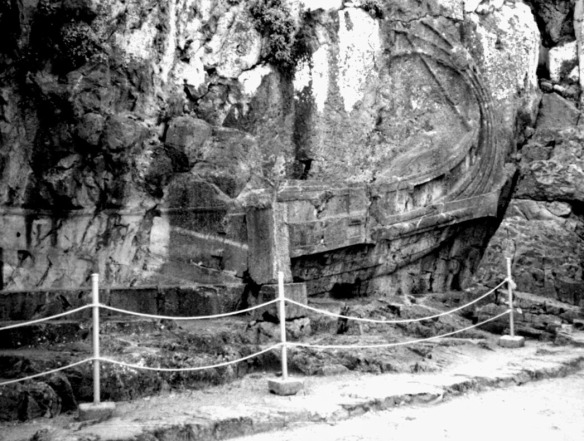
Carving of a triemolia (Rhodian ship), 2nd century BC, Lindos. Carved into the rocks on the route to the Acropolis at Lindos. On the bow there stood a statue of General Hagesander Mikkion, by sculptor Pythocritos. Dates from c 180 -170 b.c.
Most easterly of the islands in the Aegean, situated off the coast of Caria in Asia Minor. From the time of Vespasian (ruled 69-79 A.D.), Rhodes, known as Rhodus, was attached to the province of ASIA. The island had a long history of excellent relations with Rome, helping in the Macedonian and Mithridatic Wars. Supporting the cause of Julius Caesar during the Civil War, Rhodes was plundered mercilessly by Gaius Cassius in 42 B.C. but was richly rewarded by Augustus for its loyalty. Starting in 6 B.C., Tiberius took up residence on the island in a self-imposed exile from the disappointments of Rome; he would depart to become adopted by Augustus in 4 A.D. Because of their act of crucifying several Roman citizens, the Rhodians were deprived of their independence in 44 A.D. by Claudius. Appealing to Nero in 53, they were given their own government again, although prosperity was never actually attained. An earthquake in 155 A.D. flattened most of the island, and henceforth it remained one of the least developed corners of the Empire.
Piracy in the ancient world has long been associated closely with Rhodes, the pirate police of the Mediterranean. The island republic, though not very large, managed to maintain a great deal of political independence for a great many years, even when surrounded by large, competing powers. Its campaigns against piracy can be attributed to its dependence on the sea. Tarn wrote, “It was only states like Rhodes, subsisting entirely on sea-borne commerce, or Athens, dependent on sea-borne corn, that felt any real interest in clearing the seas.” Indeed, Rhodian forces had for so long patrolled the Mediterranean that the pirate crisis of the late republic is often blamed on the downfall of Rhodes.
Rhodes managed to stay out of Rome’s way and provide suitable assistance until an unfortunate turn of events in the early second century b. c. e. As a result of some poor political maneuvering by Rhodes and aggressive tactics by Rome actions were taken against the island in 167 and 166 b. c. e. First, the regions of Lycia and Caria, formerly gifted to Rhodes in the treaty of Apamea in 189 b. c. e., were revoked. Then, in a decree in 167 b. c. e., the Senate declared the island of Delos a free port. Lycia and Caria had been sources of significant income for Rhodes in a period when it stood at the “peak of its power.” Delos, the slave center of the ancient world, benefited enormously from its new tax-free status, and R hodes lost a great deal of business.
Though never large, this should be the best fleet of the ancient period. Excellent seamanship coupled with generally heavier types than the Carthaginians. Superior Rhodian naval architecture was a state secret, with the sentence death passed on unauthorized persons in military shipyards. Frequently allied to Rome, the Rhodians provided the major check on pirate activity in the Mediterranean. When Roman policy later diverted trade revenue from Rhodes destroying the economic basis of the fleet, the Mediterranean largely fell under the control of pirates.